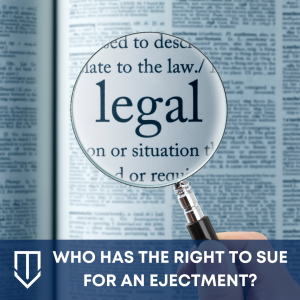 Ejectment is an action brought by a party seeking to recover a possessory interest or claim of title in a piece of real property. Typically, an ejectment action arises when a titleholder to a piece of property has been wrongfully excluded or withheld from the property. Therefore, ejectment applies only to those cases where an individual actually has possessory title to the subject property.
Ejectment is an action brought by a party seeking to recover a possessory interest or claim of title in a piece of real property. Typically, an ejectment action arises when a titleholder to a piece of property has been wrongfully excluded or withheld from the property. Therefore, ejectment applies only to those cases where an individual actually has possessory title to the subject property.
Ejectment is a possessory action used to recover possession of land or a piece of real property to a plaintiff in possession who has been wrongfully ousted from the property by the defendant. (Fuller v. Fuller (1917) 176 Cal. 637, 638, 169 P. 369].) In simpler terms, ejectment allows a party to retake possession of real property that the party was wrongfully removed from.
A claim of ejectment is a common issue in disputes over the real property where the parties are seeking to establish who holds title to or an interest in the subject property. Specifically, under Code of Civil Procedure section 3375, an individual who is entitled to specific real property may recover by a judgment for its possession or an order requiring a defendant to deliver possession of the property. (CCP § 3375.) At Underwood Law Firm, our attorneys are more than familiar with ejectment actions and the requirements needed to prevail on an ejectment claim.
 Exceptions in a title report, also called a preliminary title report, make a potential buyer aware of issues with the property. Exceptions are important as they may limit what title insurance a buyer is eligible for and may prevent the sale of property altogether.
Exceptions in a title report, also called a preliminary title report, make a potential buyer aware of issues with the property. Exceptions are important as they may limit what title insurance a buyer is eligible for and may prevent the sale of property altogether. California Partition Law Blog
California Partition Law Blog


 Ejectment is an action brought by a party seeking to recover a possessory interest or claim of title in a piece of real property. Typically, an ejectment action arises when a titleholder to a piece of property has been wrongfully excluded or withheld from the property. Therefore, ejectment applies only to those cases where an individual actually has possessory title to the subject property.
Ejectment is an action brought by a party seeking to recover a possessory interest or claim of title in a piece of real property. Typically, an ejectment action arises when a titleholder to a piece of property has been wrongfully excluded or withheld from the property. Therefore, ejectment applies only to those cases where an individual actually has possessory title to the subject property. The deed to a property is the most important document a property owner has. It describes the title and its associated rights while operating as the grant of the property itself. But not all deeds are created equal.
The deed to a property is the most important document a property owner has. It describes the title and its associated rights while operating as the grant of the property itself. But not all deeds are created equal.